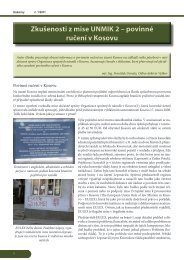TRADOC Pam 525-3-7-01 - TRADOC - U.S. Army
TRADOC Pam 525-3-7-01 - TRADOC - U.S. Army
TRADOC Pam 525-3-7-01 - TRADOC - U.S. Army
- No tags were found...
You also want an ePaper? Increase the reach of your titles
YUMPU automatically turns print PDFs into web optimized ePapers that Google loves.
<strong>TRADOC</strong> <strong>Pam</strong> <strong>525</strong>-3-7-<strong>01</strong>Training scenarios in field and situation training exercises at home station and especiallythe combat training centers (CTCs) must have the capability to integrate ambiguous andcomplex situations involving legal and moral-ethical issues, with particular emphasis onapplication of rules of engagement and moral reasoning in complex situations, followedby rigorous critique of choices made in terms both of costs and benefits of decisions andmoral ethical implications.Future Modular Force commanders must have the capability to integrate into the predeploymenttraining program, cultural training targeted to the intended AO.Habitually integrate cultural complexity into <strong>Army</strong> training exercises especially the CTCsas challenges to mission accomplishment and the subject of after action review (AAR)assessments.IMT must possess the capability to identify those with an aptitude for languages anddevelop that aptitude through additional training and education.IMT must initiate the process of instilling cultural awareness and sensitivity in newrecruits and officer cadets.Soldiers in intelligence, law enforcement and protection specialties must receiveprofessional training that gives appropriate emphasis to the importance of culturalunderstanding to the development of human and police intelligence.The <strong>Army</strong> must develop the capability for distributed education to sensitize and prepareSoldiers for the difficult decisions that will confront them.With the costs of real time force on force training increasing, training simulationsdesigned to improve individual and collective competence at lower cost require thecapability to integrate complex moral ethical situations requiring rapid decisions. Thesimulations must also be capable of discreet outcomes and results based on leaderdecisions.The <strong>Army</strong> must continue to develop technologies and material solutions that can assist indeveloping necessary Soldier, leader, and unit language and cultural proficiency for useacross the training domains.Provide digital translation through personal digital assistant-like devices uploaded withlanguage recognition and translation software for use by small units whentranslators/interpreters are unavailable. These devices should also enable wirelessreachback to information databases on language, culture, and customs.Extensive acquisition of “in home” language training for use by Soldiers to achieve atleast minimal language proficiency.The enormous cost of real time training argues for the rapid development and acquisitionof individual, leader, staff and small unit level interactive simulations that integratelanguage, interpersonal, cultural, adaptive thinking, negotiation, and complex problemsolving skills into multiple time-constrained scenarios.Officer and NCO professional education at all levels must have the capability to deliverprogressive and sequential content on those skills, knowledge, and abilities required to developand sustain Soldier and leader character that develops and sustains the warrior spirit, Soldiermorale, and unit cohesion, and prevents combat and operational stress reactions (COSR)casualties.81



